In his latest work, Pre-Suasion, psychologist and best-selling author Robert Cialdini presents a 7th principle of influence: unity. We’ll tell you what this principle is all about.
And what’s more: we’ll give you 6 surprising ways to make more money with this new principle. Because you’ll be able to persuade your visitors even more.
First, Cialdini had only 6 principles
In his groundbreaking book ‘Influence’ Cialdini explains the 6 principles on which his influencing strategies are based.
- Social proof
The power of the masses, or in other words: everybody’s doing it. Even Elvis Presley knew this: ‘’50,000,000 Elvis fans can’t be wrong”.
- Authority
Someone with a thorough understanding of their profession says so too: “Sensodyne, the first choice of dentists”.
- Scarcity
If we think that something is about to run out, we want it more: “Yes, you can still buy a fluorescent orange bodywarmer. But it’s the very last one we have”.
- Commitment and consistency
Once we openly express our loyalty to a product or our commitment to an idea, we want to turn our words into concrete actions. Doing this makes us consistent. And we like that! If you sign a petition, you will be inclined to “like” it on social media – and vice versa.
- Liking
The more we like someone, the greater this person’s chances are of persuading us. This brings to mind the many “about us” pages and videos on websites. These allow companies to show their target audiences the people behind their brands. Nice, right?
- Reciprocity
If someone does us a service, we want to be able to reciprocate. People hate having outstanding debts. So, if you give something first, you will get something back more often.
Enter the 7th principle: unity
Over three decades later, Cialdini added a 7th principle to this list: unity.
In an interview with psychologist and journalist Luca Mazzuchelli, Cialdini tells us why the concept of unity only came to him many years after he had developed his other insights:
‘I did not see it earlier, because it was concealed beneath the other six. (…) Unity means that we want to say “yes” to people with whom we share an identity more often than to people who are not part of this group. To persuade people, you can appeal to a number of common characteristics with regard to identity. If an identity like this is genuine and recognizable, you will have a greater chance of receiving a positive response to proposals or recommendations.’
What is the principle of unity exactly?
Unity is a shared identity between people. If we consider someone to be “one of us”, this person will be able to exert more influence on us.
Just think about how that works between family members. Even though parents of teenagers may experience this differently, it is nevertheless true: as a family member you have lots more influence on someone than an outsider does.
Although family perhaps illustrates the concept of “unity” best, there are numerous other groups that appeal to a strong sense of identity. Ethnic background, religion, nationality or the political party you belong to: these are all groups that tie people together through common characteristics.
Not to mention professions. Or am I the only user researcher who likes to play with the emotions of designers, programmers and marketeers?

6 ways you can appeal to the principle of unity
1. Appeal to your reader as a member of a group
A website that sells supplements for bodybuilders could say, for example: “As an avid athlete you know better than anyone else how important the right nutrition is”.
Boom! Your reader will be part of the group called “avid athletes”, and is now in your club.
2. Social proof and the principle of unity
Whether you have children or not, whether you’re single or married, what age you are: these are all elements that determine your identity. And each of these groups is capable of influencing.
The opinion of someone who has something in common with you is more relevant than that of a stranger with whom you do not share an affinity. And the better a website can establish this link, the greater the response will be.
Booking.com uses this knowledge to its advantage through its reviews. You can filter reviews depending on your own situation.
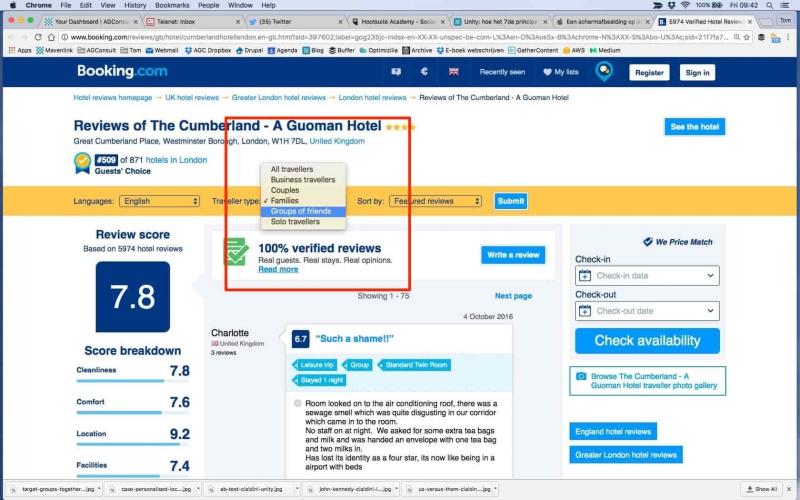
Lots of travel sites use this principle. Another example is this one from JetBlue.
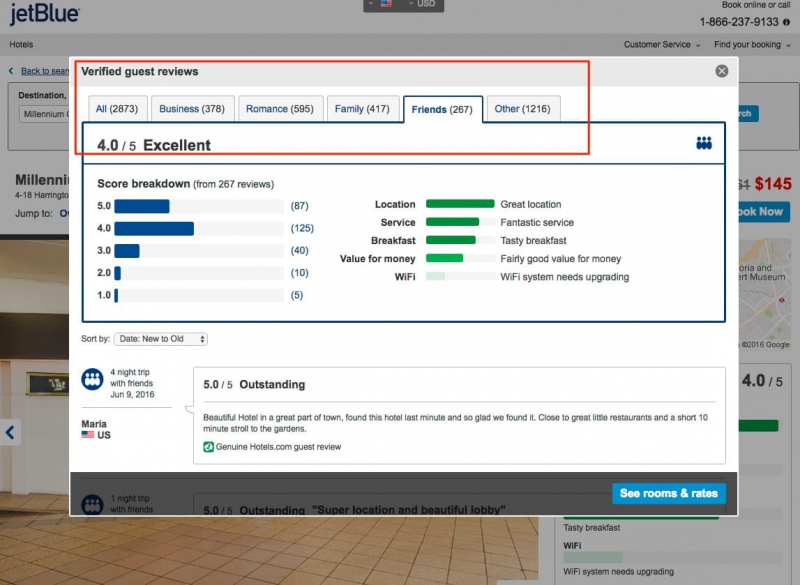
The concept of unity is also very good for quotes. Don’t only mention the name of the person you are quoting: also include details like a person’s profession, age and the town or city they live in. Of course, the characteristics you should or shouldn’t include depend entirely on what is relevant to your business or target audience.
3. Us against them
Influencing by appealing to the principle of unity works in different ways. As illustrated above, you can opt for the exclusive approach: “Welcome to our club!”
However, you can also influence people by distancing yourself from another group: “Most importantly, we are not like that bunch of losers”.
Just remember how in the 1960s people had to be either for The Beatles or The Rolling Stones. Or consider the recent rivalry between Apple and Microsoft aficionados.
Or that between readers of “regular” books for whom a tablet is good enough and the “genuine” ones, who of course want an e-reader.

4. Location
Location is another factor that creates a sense of unity. Where you come from says a lot about who you are. Lots of people like the Facebook page of their hometown, for example.
Another classic is of course John F. Kennedy’s historic quote: “Ich bin ein Berliner”.
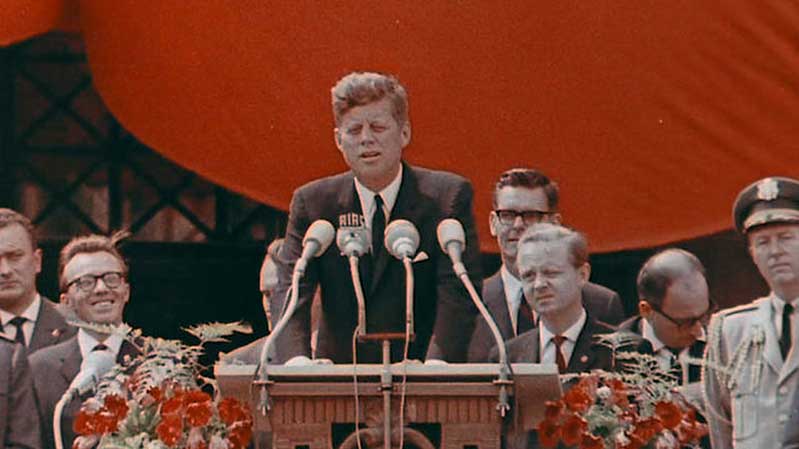
Even if you don’t have a fabulous relationship with your neighbours, if your entire street is considering a group purchase you will find yourself agreeing to take part more quickly than not.
A/B tests show that making a reference to your visitors’ home town, city or region can have a tremendous effect. Positive or negative.
Widerfunnel conducted an A/B test to find out whether a car insurance ad would work better if it showed visitors a personalized location. As an alternative for the generic ‘this many Americans’.
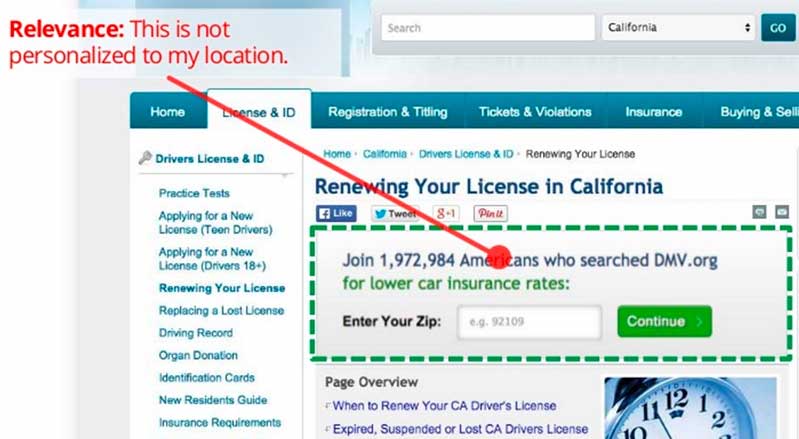
The result?
Not all Americans are alike! Some parts of the country show a lot more regional pride than others.
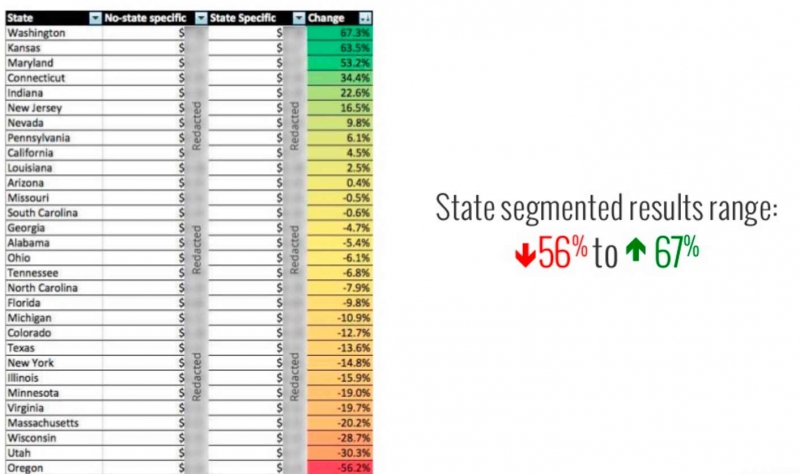
Just as in any other situation, there are no best practices that you can adopt blindly. Not even if Cialdini said it.
A good idea has to be tested to see if it will work when applied to your specific situation. It is the basic idea of conversion optimization.
5. Co-creation
Another factor that plays a distinct part in the establishment of unity is co-creation: collaborating on a project. A hotel that asks you in person if your stay could have been improved in any way will appeal to you much more than one that asks you to the same question by shoving a standardised form under your nose.
This is also something that companies should remember when speaking to their customers. A customer will tend to respond with greater loyalty if he or she feels like more than just another customer. Upgrade him or her to the status of a partner in your project: “We are doing this together”.
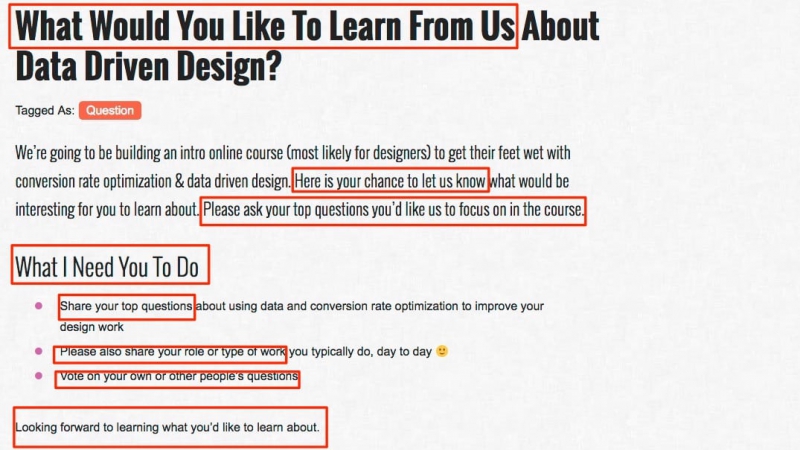
6. Appealing to familiy ties
Appealing to family ties is another successful method for gaining greater influence. In ‘Pre-Suasion’ Cialdini pays a lot of attention to this. It’s probably the most self-evident use of his principle.
The idea has been used in advertising for ages. Parents and children, sisters and brothers, … people just won’t stop bugging us about this.
Take banks and insurance companies. They appeal to the emotions of parents who do not want their children to have a future without a little financial support.
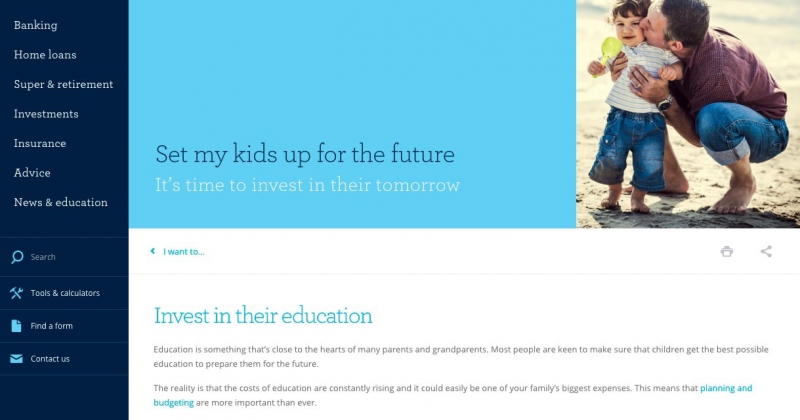
Nothing new under the sun?
You are probably thinking: “But isn’t all of this pretty obvious?” And of course: you are right.
All of the examples above show that the “unity” principle has been applied since time immemorial. Long before Cialdini came up with his 7th principle.
The merit of Cialdini is not that he came up with an amazing new insight – which he doesn’t claim to have done, by the way.
But unity as the 7th principle does complete Cialdini’s theory of influencing, which is enough to make it of substantial value to us.
Do you know other ways to use the principle of unity? Interesting other examples? Please share them with us in the comments.

Leave a Reply